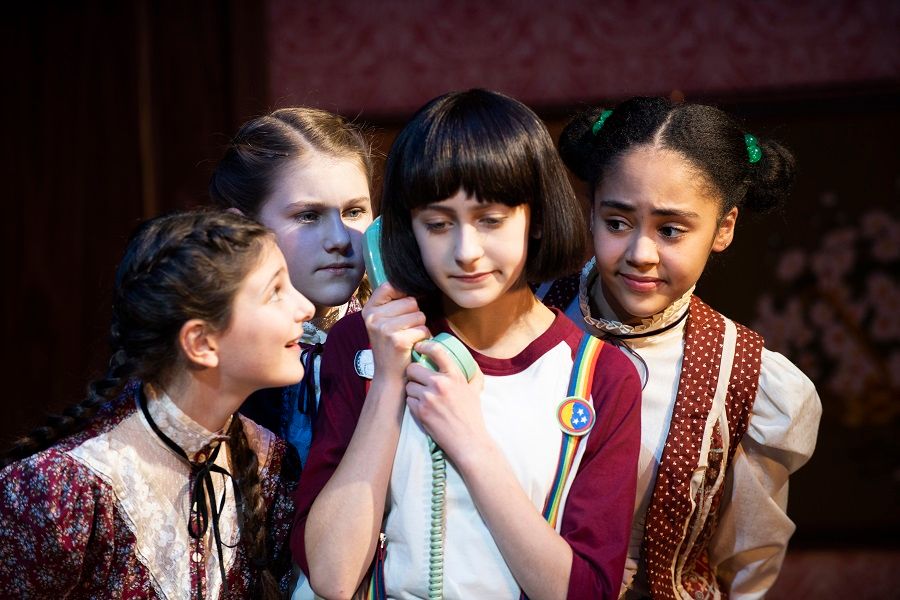When the lights come up on The Bedwetter, a new musical at the Atlantic Theater Company in New York City, a sweetly exuberant 10-year-old girl in rainbow suspenders named Sarah (played by Zoe Glick) introduces herself to her class, and it takes about 30 seconds for her to drop her first F-bomb. This is not just any new kid; this is a young Sarah Silverman, who will blossom into the comedian we love at least partly for her transgressive, potty-mouthed humor, who wrote the memoir on which the show is based.
Silverman was the bedwetter of the title for much of her childhood, and the show tracks about a year of her efforts to overcome this nocturnal curse while hiding it from the kids in her new hometown of Bedford, N.H. It doesn’t help that no one in Bedford has ever seen a Jew before and that her parents’ marriage has recently disintegrated.
That first speech sets the tone for much of the show—innocent and playful, with a healthy dose of grown-up grit—and channels Silverman’s comic sensibility. But the script doesn’t shy away from weightier themes, including depression, psychotropic medications, and suicide. The balancing act of The Bedwetter is to manage to stay funny while treating its subjects seriously—and it pulls this off largely through song.

If little Sarah has a bumpy road ahead of her, it is mirrored by the fraught journey adult Sarah has been on in mounting this show. The Bedwetter was originally slated to begin rehearsals in March of 2020, but the pandemic hit and the production got shelved. Less than a month later, Silverman tragically lost her close friend and songwriting partner, Adam Schlesinger, who died of COVID at age 52. The whole show had actually been Schlesinger’s idea nearly a decade earlier. Silverman says he showed up at her house, clutching the memoir, and saying, “This is a musical! ‘The Bedwetter’—that’s a song!”
Thankfully, the folks at the Atlantic stuck by her through the dark days of the pandemic, holding weekly Zoom meetings with the creative team and repeatedly affirming their commitment to the project. They also brought on Tony-winning composer David Yazbek to help develop Schlesinger’s score.
“We had to find someone, not to replace Adam but to fill the void left by his absence,” Silverman said in a recent interview. “There was only one person we could imagine, and I know it’s the only person Adam could imagine, and it was David. He’s taken on a very selfless role, and he’s taking it really seriously.”
Henry Aronson, the show’s music director, said he has also felt a huge responsibility to stay true to Schlesinger’s vision. “Adam’s musical language was very sophisticated, as were his lyrics,” Aronson said. “So it’s very much front of mind. I’m proud to be able to do it, and I’m sad to be able to do it. It is a challenge, and it’s also an honor and a privilege.” He also noted that Schlesinger had a rare gift, as “a songwriter who could write a funny song with a punch line.”
Now, more than two years down the road, The Bedwetter has been the beneficiary of a long, thoughtful development process and, its creators say, has taken on new dimensions as a result. “It’s just been about deepening,” Silverman said, “using the time we had to create layers of meaning and depth. It would have been a really solid show two years ago. I think it’s far more fully realized now.”
Anne Kauffman, who’s directing, echoed this sentiment. “Every show should be ready to go into rehearsal and then have a two-year gap to think about it,” she said. “It has been extraordinary. It feels like a deepened and completed idea.” Not only that, she said, but coming back to put the show on its feet after so long was that much sweeter. “For all of us, what we went through, it was joyous coming back and recommitting.”

Writing and staging a theatrical piece is a new endeavor for Silverman, though she is a lifelong musical theatre lover. She called the experience “exhilarating,” and said she feels lucky to be among so many masters of the craft. Not that there hasn’t been a period of adjustment.
“It’s really odd to come from stand-up and stuff, where I have autonomy over how my life is expressed, and this is a lot of collaboration,” she conceded. “But I’m just in awe of the people I’m collaborating with. We feel very comfortable around each other. There’s isn’t this deferential tiptoeing—we put it all out there, we disagree, but we always work it out.”
Kauffman returned the compliment, admiring Silverman’s collaborative and open spirit, especially with such a high-stakes and personal effort. As the book’s co-writer, Joshua Harmon, often points out, it’s Silverman’s family up there. The show necessarily elides and compresses some of the facts of Silverman’s life, but it is fundamentally autobiography—and of the warts-and-all variety. “It’s a huge thing for a writer, a creator, to put themselves onstage,” Kauffman averred. “It’s really vulnerable.”
Silverman’s real-life family—many of whom show up as singing-and-dancing versions of themselves, in their loudest early-1980s attire—have been coming to see the show during previews and, Silverman said, their responses have so far been good. Her father even came five times in one weekend, obviously loving it and taking no umbrage with the character based on him, who engages in some unsavory behavior but also fiercely protects his daughters. Her dad also told her he couldn’t get over how much Bebe Neuwirth, who plays Sarah’s grandma, reminded him of his mother.
“I told my family to just go in with the perspective that this is loosely based on truth,” said Silverman, “and you will be happily surprised at how completely accurate and true it is.”
The beating heart of the show is a gaggle of kids—Sarah and her school friends—and the young actors playing these roles, all between 13 and 14 years old, seem like they’re having a blast, delivering Silverman and Harmon’s edgy lines and singing lyrics about pee and divorce and the Miss America pageant. Both Kauffman and Silverman confessed some trepidation about working with such a young cast, but both have found that their presence charges the piece with energy.
“It’s always joyful to have young people to remind us that we’re really lucky to be doing this,” said Kauffman. Aronson added that the kids “work harder than anybody. They’re so committed and not cynical or tired of the whole thing.” The surreal part for Silverman, she said, is watching the hugely talented Glick embody her so perfectly, night after night: “I feel like I’m watching a little me.”
In truth, the older members of the cast look like they’re having quite a bit of fun as well. It’s hard not to walk out of the theatre with a bounce in your step, not only because of the irreverent humor and the upbeat musical numbers, but because the show makes a big, splashy plea for all of us to be unapologetically ourselves. Like so much of what Silverman has done on her podcast, where she gives thoughtful advice to troubled callers, or on her recent TV show, I Love You, America, on which she tries to find common ground with red state voters, The Bedwetter treats our hang-ups and limitations with compassion.
“There is really nothing to be ashamed of,” said Silverman. “We are all just beings of circumstance, and what we do with our failures and with our feelings is who we are.”
Kauffman said The Bedwetter is the first production she’s directed in the COVID era, and it was exactly what the doctor—or, in this case, perhaps the wacky, Xanax-peddling shrink—ordered. “It affirms my love for what theatre does for me and potentially does for other people,” she said. “It’s been really uplifting. It’s the material, it’s the people, and it’s Sarah. Sarah is at heart a cheerleader for humanity. She makes everyone happy.”
Pamela Newton (she/her) is a writer based in New York City.


